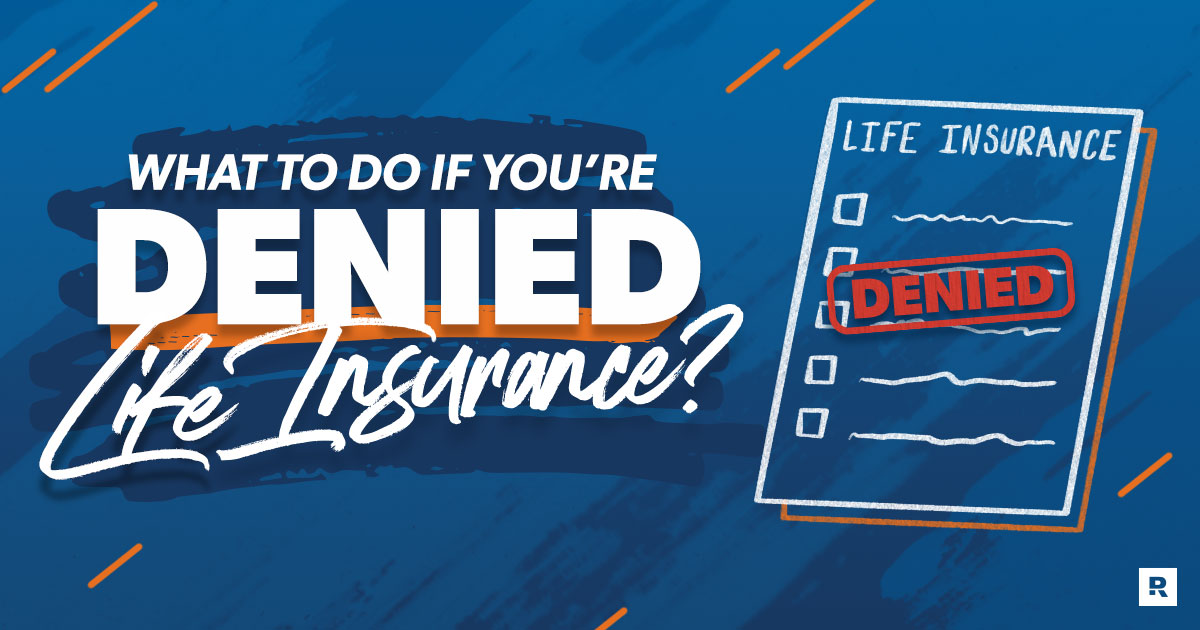
There’s nothing worse than hitting a roadblock when you’re trying to do the right thing to protect your family, right? Like applying for life insurance only to find out your application has been denied. If this happens, what’s your next move?
Don’t worry: There are options out there, and we’re here to walk you through exactly what you should do if your life insurance application is denied.
Ask for More Information
Opening that letter from the life insurance company and seeing, “Sorry, but . . . ” is enough to worry anyone—especially if you have a family who relies on your income. So if this happens to you, your first move should be to contact your insurance agent or company to find out the why behind your life insurance denial.
Insurance companies look at your medical and nonmedical risks when they’re running through your application to see if you qualify and figure out costs. Their reasons could be anything from a serious medical condition (like heart disease) or poor results from your life insurance medical exam to nonmedical reasons like bankruptcy, a criminal record, a positive drug test or even a dangerous hobby—carriers are not fans of insuring base jumpers in squirrel suits. Yes, these are things.
Review Your Case
Once you have the reasons why, you can make sure they have their facts straight—because no one knows your situation better than you! If any of the information they sent back doesn’t look up to date or is just plain wrong, now is the time to appeal.
If the reason you were denied is based on incorrect or insufficient medical information, you have the right to appeal. For example, maybe you had high blood pressure a couple years ago and now it’s resolved, but the insurance company didn’t notice. The best way to appeal is by asking your doctor to provide the insurance company with as much up-to-date information from your medical file as possible.
You can appeal nonmedical reasons too, like an out-of-date financial record, an old driving offense, or incorrect details about your job and hobbies that put you in the high-risk category. If you’re not actually base jumping in a squirrel suit anymore, you should tell them—it’ll make a big difference.
Keep in mind, if you’re older and have enough money saved, you may not need life insurance because you can self-insure (this is where your investments generate enough growth to replace your income).
Check With Your Workplace
If it looks like your life insurance application denial is based on accurate information, it’s time to check with your employer. Your workplace could offer a group term life insurance plan that you could sign up for.
Here’s the deal: It won’t give you the 10–12 times your income coverage that we recommend, but it will offer something in the way of a death benefit until you can get your own term life insurance down the road.
A group plan usually doesn’t cost you anything either. If you want to increase its payout, you can “supplement” it, but this will cost you. Supplementing your group plan is an option if you need it and really have no other options. But don’t sign up for any extra “riders” the company benefits representative offers you—they are not worth it!
Your workplace life insurance plan could help you get coverage in a pinch because they don’t ask for a medical exam. Just remember: If you leave your job, you’ll lose your coverage.
Reach Out to a Life Insurance Agent
If you haven’t done this already, it’s time to call an expert! An independent life insurance agent is a lifeline when you’re having trouble getting insured.
Compare Term Life Insurance Quotes
And the good thing about agents is that they know the ins and outs of the life insurance underwriting process (all the behind-the-scenes stuff that decides if your application is approved or denied).
So, this means an agent should be able to pick up on—and work around—any red flags in your application that might have caused you to be denied in the first place. And it’s worth noting that just because you’re denied by one company, that doesn’t mean all insurance companies will deny an application from you.
Unlike just going online on your own (and hoping to find a company that accepts you), agents can search across a much wider market for a policy that’s worth it and works for you. They’ll also advise you on the next steps you need to take—which in some cases could mean they suggest you hang tight for a few months and apply at a later date.
Talking to an independent insurance agent with Zander Insurance worked for Teresa R. from the Ramsey Baby Steps Community on Facebook.
“I have mental illness and was automatically told I could only get a final expenses policy (10-year term, $100,000 policy for $75 a month) with no medical exam—because I wouldn't pass it,” she said. “Then I called Zander. I was able to get a 20-year term, $500,000 policy for $70 a month and passed a medical exam.”
Connect With an Agent You Can Trust
RamseyTrusted partner Zander Insurance will do their best to get you covered based on your unique circumstances. Get on the phone with them and see your options.
Allow for a Waiting Period
Sometimes when you’re denied life insurance, your best bet is to play the waiting game and give yourself a chance to correct any health issues that led to your denial.
For example, if your blood pressure is through the roof or you need to lose weight, it will take time to build healthy habits and see the results. Use that denial letter as motivation to improve your diet and take those daily walks! Life insurance is great—and you don’t need to give up on that goal. But you can never lose when you choose to get healthier.
If you keep up good habits like eating healthy (mmm, kale), quitting smoking, and exercising regularly (you can do it!), it could make all the difference the next time you apply. Don’t give up! Try to change the things you can control.
And time could help with the nonmedical reasons for denial too—like letting enough time pass for those multiple speeding tickets to fall off your record. A short break might be all you need to get approved the next time you apply.
While you’re in the waiting period, use that time to boost your emergency fund. Any extra amount you can save will give you more peace of mind while you’re searching for life insurance.
We know it can feel like the world’s against you at a time like this, but if you can make some small changes while you’re waiting, you’ll be in a stronger position moving forward.
Apply Again, But for a Different Policy
It could be that you’re just reaching an age when your usual insurer doesn’t offer the kind of life insurance you applied for. For older folks, the policy term for term life insurance gets shorter. Getting approved for life insurance as a senior may be as simple as applying for a shorter term.
If your problem is a serious health condition, however, and other routes (like your employer-offered life insurance we mentioned earlier) aren’t available, there are a few no medical exam life insurance plans you can consider. But they will still ask you all the same medical questions. (You’re probably not thinking this, but just know, if you fudge on your health status when filling out a medical questionnaire, your life insurance might not pay out when your family eventually files a claim.)
If you’re uninsurable, these plans offer you something—and that’s better than not having any coverage at all. But you should always speak to an insurance agent before applying to see which—if any—option is right for you.
Simplified Issue Life Insurance
These policies don’t require a medical exam, but you’ll have to fill out a medical questionnaire along with your application. The questions will ask if you have any serious medical conditions—so if you do, you probably won’t get approved for this type of coverage. Simplified issue premiums will cost you more because the company only has information from the questionnaire instead of a professional medical exam to make its decision. Payouts are usually limited to $500,000 or less, but this type of policy could work if your health condition isn’t serious.
Guaranteed Issue Life Insurance
If you’re older or have a serious medical condition, a guaranteed issue plan allows you to get life insurance without a medical exam and without having to answer dozens of questions in a medical questionnaire. But the downside is the payout: It’s small—usually only up to $50,000.
And some policies will limit your benefits payout if you die in the first couple of years. So you might get back the premiums you paid—but nothing more. If you have a serious medical condition, you’ll need to weigh whether it’s worth paying a hefty premium for such a small payout (or none at all).
Mortgage Life Insurance
Mortgage life insurance only covers your mortgage balance. You won’t need to take a medical exam for this type of policy either. If you already have a mortgage, you’ll just need to answer a few health questions once your mortgage is issued. So this could work if you’ve been denied regular life insurance and don’t have a serious medical condition. You can also get this type of life insurance with no health questions if you’re refinancing your mortgage.
Only use this as a last resort if you can’t get anything else. If you can get term life insurance, that should be all you need.
Bottom line: No medical exam policies like mortgage life insurance will cost more than regular term life insurance, and the payout won’t be as good. But they‘re worth considering if your options are limited.
Interested in learning more about life insurance?
Sign up to receive helpful guidance and tools.
Don’t Give Up
The reason you get life insurance is to replace your income so your family is provided for if anything were to happen to you. And when you struggle to get approved, it causes worry and stress. But there are ways to get back on the road to coverage—and people you can call on to help.
Next Steps to Get Life Insurance
- Still have general questions about coverage? Check out our Ramsey term life resource page.
- Maybe you’re wondering how much coverage you need? We got you. Check out this handy term life calculator to get a realistic idea of how much coverage you need for your specific situation.
- Wondering about cost? Hey, we love it when you get intentional with your budget! This term life estimator can give you a solid sense of how much you can expect to pay for term life insurance.
- If you’re ready to get covered now, reach out to RamseyTrusted provider Zander Insurance today! Zander has decades of experience in matching people with the right term life insurance plan. They’re the experts you can trust to find you the best term life quote.


